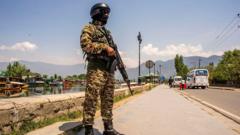Pakistan's information minister, Attaullah Tarar, reiterated that the country possesses "credible intelligence" about potential Indian military strikes expected within 24 to 36 hours. This warning follows India's recent allegations that Pakistan supported militants responsible for a gruesome attack on civilians in Indian-administered Kashmir, which left 26 tourists dead near the popular site of Pahalgam last week. Islamabad has vigorously denied these claims.
Tarar asserted that India aims to use the deadly incident as a "false pretext" for launching military action, cautioning that any aggression from India would be met with a definitive and unwavering response from Pakistan. The BBC has reached out to India's foreign ministry for a response to these allegations.
This incident marks the deadliest attack on civilians in Kashmir in two decades, a region that has been a contentious battleground for both countries since partition in 1947. In recent days, both nations have seen a rise in small-arms fire across their shared border, prompting concerns about escalating military tensions.
The deadly attack has led Indian authorities to conduct widespread operations in Kashmir, detaining over 1,500 individuals for questioning and demolishing the homes of alleged militants, although the clarity surrounding these incidents remains murky.
While India has yet to publicly identify the group responsible for the Pahalgam attack, a little-known group initially believed to be involved has since denied any responsibility. Survivors indicate that the attackers specifically targeted Hindu men during the incident, intensifying national outrage in India.
Prime Minister Narendra Modi has vowed to pursue those behind the attack, promising that they will be held accountable "beyond their imagination." As both countries brace for potential fallout, the international community watches closely for developments in this historically fraught region.
Tarar asserted that India aims to use the deadly incident as a "false pretext" for launching military action, cautioning that any aggression from India would be met with a definitive and unwavering response from Pakistan. The BBC has reached out to India's foreign ministry for a response to these allegations.
This incident marks the deadliest attack on civilians in Kashmir in two decades, a region that has been a contentious battleground for both countries since partition in 1947. In recent days, both nations have seen a rise in small-arms fire across their shared border, prompting concerns about escalating military tensions.
The deadly attack has led Indian authorities to conduct widespread operations in Kashmir, detaining over 1,500 individuals for questioning and demolishing the homes of alleged militants, although the clarity surrounding these incidents remains murky.
While India has yet to publicly identify the group responsible for the Pahalgam attack, a little-known group initially believed to be involved has since denied any responsibility. Survivors indicate that the attackers specifically targeted Hindu men during the incident, intensifying national outrage in India.
Prime Minister Narendra Modi has vowed to pursue those behind the attack, promising that they will be held accountable "beyond their imagination." As both countries brace for potential fallout, the international community watches closely for developments in this historically fraught region.



















